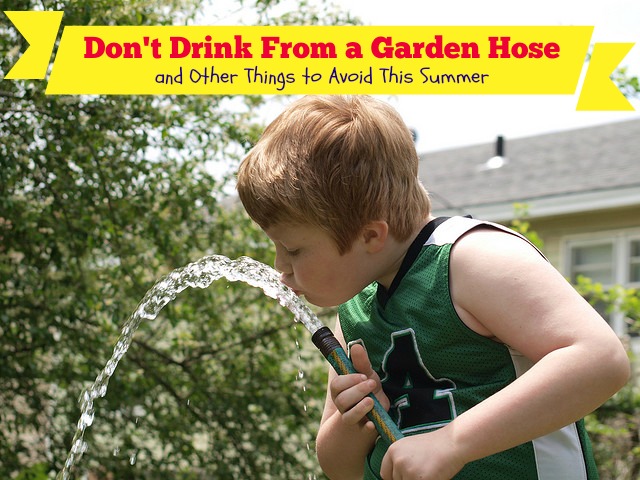How many times have you reached for a drink from the garden hose on a hot summer day? Guilty! My kids love it too.
If you haven’t already, it’s time to stop. That garden hose is harboring all sorts of toxic chemicals.
In 2013 HealthyStuff.org tested 21 new garden hoses from Lowe’s, Home Depot, Walmart, Target and Kmart. They found:
- One-third of the garden hoses tested contained enough chemicals of concern to be ranked “high concern” including lead.
- Phthalates ,which are currently banned in children’s products were found in water hoses at high levels.
- Water samples from several hoses contained numerous chemical hazards, including phthalates, lead and BPA.
Is there a safe garden hose?
Look for a lead-free garden hose with a lead-free label. This will make taking drinks from the garden hose for pets and children much safer and also cut down on the amount of lead landing in your backyard. Here’s an example of a lead- free garden hose, which is also BPA free and phthalate free (affiliate link).
Make sure to let the garden hose run for a bit before drinking, even if it’s labeled lead-free.
Don’t use spray sunscreens
While spray sunscreens are convenient (I’m the first to admit that!), the FDA is reviewing their safety. I know how challenging it is to get sunscreen on a toddler. I have vivid memories of my three boys resisting sunscreen for many years. I wish I could say that it’s gotten better as they’ve gotten a bit older, but it’s still a struggle. What I will tell you is that aerosol spray sunscreens are not the answer.
Many spray sunscreens-especially the aerosol sprays-contain ingredients that don’t belong on your skin. The Environmental Working Group (EWG) is very concerned about inhalation of nano-sized and micronized zinc and titanium in spray sunscreen. When you spray sunscreen you are likely to inhale the fumes and this is a much more direct route of exposure than when you apply the sunscreen directly to your skin. It goes directly into your lungs.
If you just can’t bring yourself to ditch the spray or pump sunscreen make sure you never spray sunscreen around your face or mouth. When applying spray sunscreens on children, pay attention to the wind and spray in a direction that won’t blow into their faces. Lower your inhalation risk by applying it on your hands and then wiping it on your face.
Although the dangers of spray sunscreen are still being investigated, why risk exposing your children to inhalation of harmful chemicals? Switch to a safe, non-toxic sunscreen, or a non-whitening sunscreen and have a fantastic summer!
Have you switched to a lead-free garden hose? On my to-do list! How about non-aerosol sunscreens? Have you found a brand that you can’t live without?

